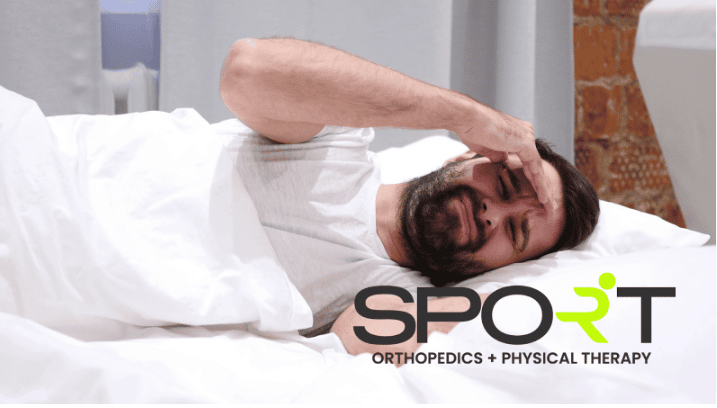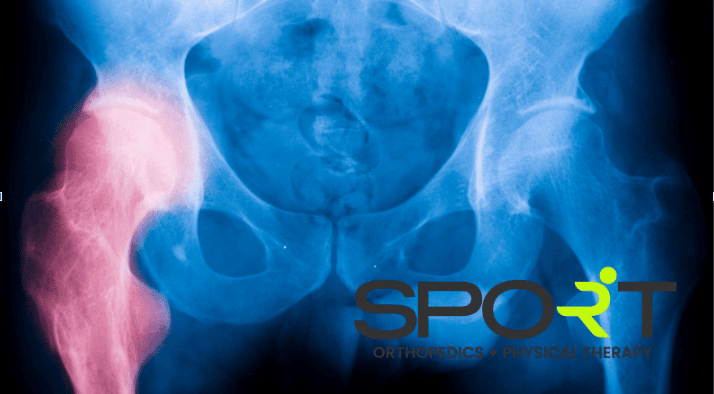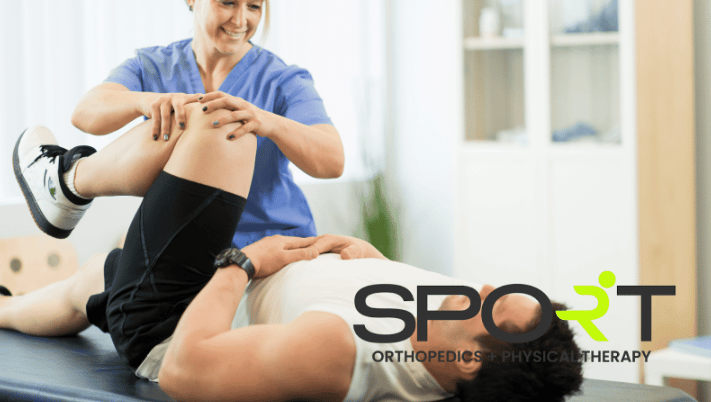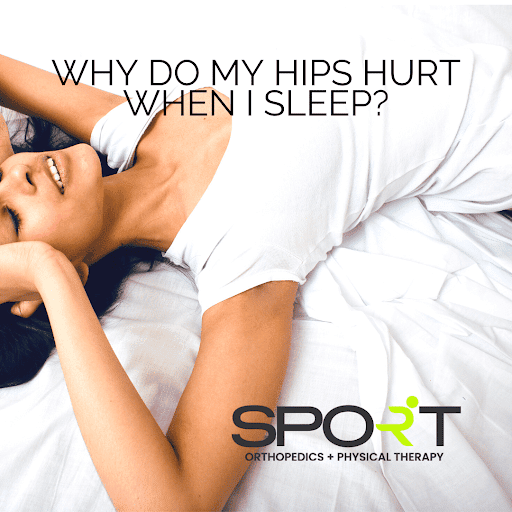Getting a good night’s sleep these days can often seem impossible, especially when you have throbbing pain in your hips while trying to fall asleep. You find yourself constantly tossing and turning for extended periods of time in an attempt to find the most pain-reducing position. Many times, you hope only to get just a few hours’ sleep and relief from your hip pain before the alarm demands your next day’s activities. If you find yourself wondering, “Why do my hips hurt when I sleep?”, this blog post is for you.
Whether it’s from an underlying health condition or a sleeping position, restless sleep can lead to a miserable next day, especially when you regularly experience hip pain at night. The truth is simple: getting a full, pain-free night’s rest is possible. When bedtime hip pain becomes a regular occurrence, stop and ask yourself a quick question, is my sleeping position causing my hip pain at night, or do I hardly move once in bed?
Once narrowing down your sleeping pattern, this can likely determine where the source of the referred pain is projected from initially. Although this may not be the answer to all your problems, it is a starting point to understanding the location of the trigger pressure points. For example, those suffering from hip pain may hardly move from their initial position once in bed. This could cause them to suffer from sudden swelling of their joints from failure to move around. When an individual’s joint swells, the stiffness and pain can lead to tight muscles, which could be one reason for your painful nights.
What Are Common Causes of Hip Pain at Night?
Hip pain, in general, often feels like a deep ache. It can also feel like throbbing or sharp pain.
The hip’s design is a compounded synovial joint constructed by a ball and socket. Together, the compounded joint is formed between the head of the femur and pelvic acetabulum. The complex structure of a hip joint carries extensive body parts, including cartilage, ligaments, bones, and other essential structures. So, it’s understandable why any damage to the hip bone can play a crucial role in initiating the body’s natural pain fighters to help provide immediate relief.
Common causes among restless, sleep-deprived, affected hip patients include:
- Hip arthritis
- Hip bursitis pain
- Hip Joints/muscle strains
- Hip Tendonitis
- Rheumatoid arthritis
- Ligament damage
- Sciatic nerve pain
- Nerve impingement
To address hip pain at night, continue reading further for more information on how the SPORT Orthopedics + Physical Therapy specialists can help your hip discomfort. When you try to avoid hip pain but end up experiencing worse pain as the night progresses, medical treatments are available to help you.
Sleep Position

Did you know that posture matters even while you sleep? An individual’s sleep position can lead to many unforeseeable and painful hip problems. If you’re a side sleeper and wake up regularly throughout the night due to hip pain, this next part likely applies to you.
What Causes Nighttime Hip Pain When Sleeping On Your Side?
Nighttime hip pain for a side sleeper can place a serious amount of pressure and strain on your hips. Regardless if you favor a side or even if you try to alternate between both of your hips, sleeping on your side can cause a sore hip that even a pain reliever can’t fix.
Additionally, neither hip joint arthritis medicines nor OTC sleep aids can hardly ever bring the issues of sleeping pain to rest permanently.
After so long of sleeping on your side, the hip pain wakes you no matter which side you choose. Eventually, you’ll find that your hip hurts no matter which side you try turning on to sleep.
You may want to try using a pillow between your legs when your hip hurts badly from sleeping on your sides. The best way to eliminate intense sore hip pain when sleeping on your side is to try a new sleeping position.
When hip pain becomes chronic at night, try changing your habits from sleeping on your side to sleeping on your back instead. The pros of sleeping on your back compared to sleeping on your side will likely outweigh the sleepless nights and eliminate the chronic hip pain that occurs from your position when sleeping.
Bursitis

Individuals with bursitis don’t always endure pain while standing. The hip pain, knee pain, and other joints that suffer from bursitis often show up right as you try to fall asleep.
Hip bursitis is a whole different level of hip pain, causing pain once the hip has become inflamed. When the hip bone and surrounding joints have their protective cushion-filled sac (bursae) inflamed, this is bursitis.
The bursae’s job is to act as a protective barrier between the bones, cartilage, joints, etc.
However, should the bursae become inflamed, thus causing bursitis, symptoms may include:
- Upper thigh pain that extends towards the outside, causing a painful hip
- Sensitive hip pain that starts as sharp pain and can cause chronic pain when touched
- Pain worse after gentle exercise, like a deep ache
- Short walk grinding sound
Hip Osteoarthritis and Arthritis
Although hip osteoarthritis ranks among the most common types of arthritis, other forms of arthritis can still cause sleeping pain and hip discomfort. Other conditions like hip bursitis, rheumatoid arthritis, septic arthritis, sciatic piriformis syndrome, and hip tendonitis are all known to be leading causes related to hip pain, especially hip pain at night.
Symptoms of hip pain related to hip osteoarthritis include things like:
- Hip pain that prevents you from getting sleep
- Extended periods of hip inability to release tight muscles and hip locking
- Weather changes causing hip pain
- An allover feeling of throbbing pain
Hip Tendonitis
Hip tendonitis can often feel like an annoying dull or ache pain. This pain is generally caused by inflammation of the tendon inside the hip. The tendon works like glue in a way to attach muscles to the bones, which allow movement.
Sciatic-Piriformis Syndrome
Have you ever experienced numbness/tingling down the backside of your lower back that travels to your buttocks, then past your legs, and down to your feet? If so, the possibility of having sciatic-piriformis syndrome is highly probable. Other related symptoms include experiencing a burning sensation near or around your calf muscle or jolt-like throbbing sensations in your legs or feet while trying to sleep.
Pregnancy

Pregnancy can do a number on a woman’s body, especially in the lower back, knees, and hips. By the time the third trimester comes along, if you have not already purchased a pregnancy pillow or if you are unable to swing the price of one, try placing a pillow or blanket between your knees to try and reduce the amount of pressure.
Additionally, try to wear supportive shoes. These offer pain management options that are better than those that place more strain on your lower back, which often causes hip pain. When searching for the perfect pregnancy shoes to help with your chronic hip pain, look for something with serious support.
When You Should See a Doctor for Hip Pain at Night
Knowing when to see a doctor for hip pain at night is crucial. When pain consistently prevents you from getting sleep, it’s time to see a doctor. Once you’ve ruled out external factors, such as trigger pressure points caused by a soft or hard mattress, then it is time to call a SPORT Orthopedics + Physical Therapy specialist.
If you feel as if you’re failing to find the right treatment, especially for sciatic nerve pain, rest assured that we have medical treatments that can address your hip pain at SPORT. A sore hip or intense pain can be a symptom of further health complications that can lead to sudden swelling, hip inability to maintain full range of motion, or worse. When pain becomes regular or chronic hip pain, call the SPORT Orthopedics + Physical Therapy specialists in Frisco and Dallas, Texas, for an evaluation to diagnose your chronic hip pain.
Diagnosis for Chronic Pain
- Physical Exam– Our specialists will conduct a physical exam as the first step of a diagnosis for your chronic pain. During the exam, the specialist may feel around and near the sides of your hip area to tackle the source of irritation, swelling, or potential injuries. Additionally, requesting a demonstration of certain activities like walking, stretching, or bending will help to evaluate for any visible malfunctions.
- Imaging– We will follow your physical exam with MRI imaging or X-rays to reveal your skeletal system. With this visibility through imaging tests, our specialist can likely determine any concerning damage to your joints. This advanced imaging and testing can unveil fractures, osteoarthritis, and other underlying health conditions relating to your skeletal problems.
- Lab Tests-The final step in our diagnosis involves lab testing. Unfortunately, not all blood or fluid samples will provide all the answers needed for a complete diagnosis. This is why we combine all three to provide a complete diagnosis to attempt to eliminate nighttime hip pain once and for all.
Treatment for Nighttime Hip Pain

Treatment for nighttime hip pain includes:
- Change your sleeping position to try and find the most pain-reducing position
- Use pillows or rolled blankets under your hips to provide cushioning
- Try sleeping with one or more pillows between your knees or under the knees
- OTC sleep aids
- Avoid sleeping on your side
- Seek help from a SPORT physical therapist in Dallas
If your hip hurts and you want to know more about your treatment options for how to kick hip pain at night, call to speak with the Dallas specialists at SPORT Orthopedics + Physical Therapy. A good night’s rest is possible with our specialists’ much-needed, proper treatment! Once you finally put the painful hip troubles, hip discomfort, and all things that stem from your sore hips to bed, you too can finally get a good night’s sleep.
Dallas Orthopedic Specialists for Hip Pain
If you’re in the Frisco or Dallas, Texas region, looking to put your hip-pain troubles to bed for good, call 469-200-2832 today for a consultation with a specialist at SPORT Orthopedics + Physical Therapy.



